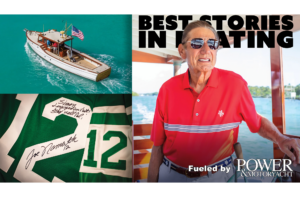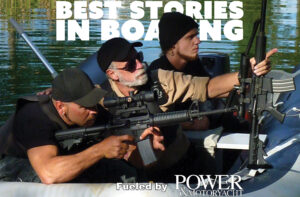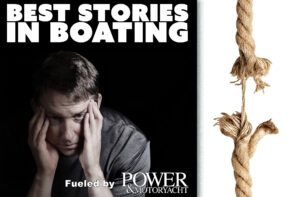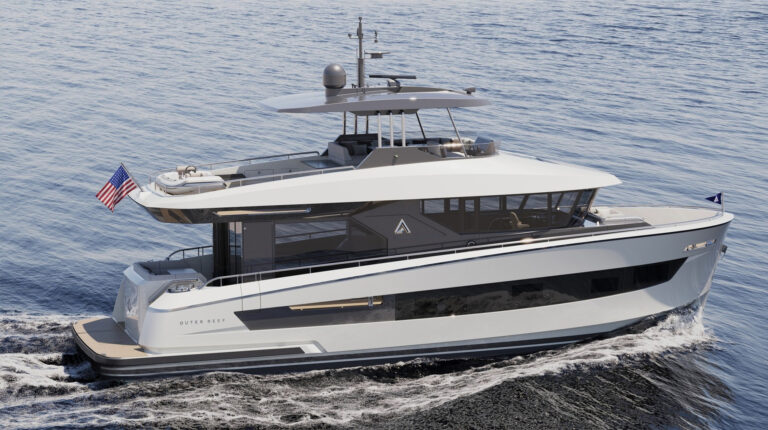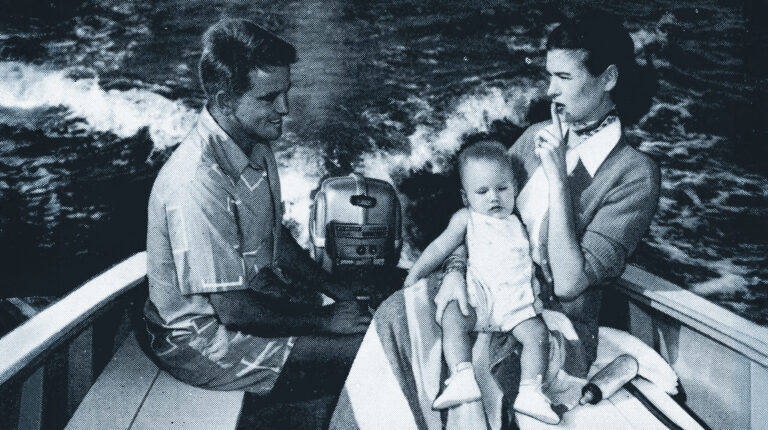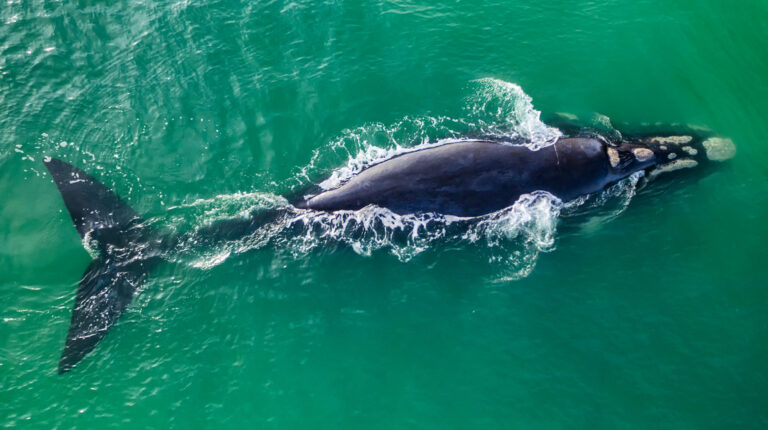Portraits by Keith Carlsen

After a Long, Wild Ride, Coast Guard Rescue Swimmer Shannon Scaff Ponders a Storied Career and Plots His Next Big Mission.
On January 25, 2000, the conditions off Elizabeth City, North Carolina were simply terrible. A cold-front-spawned low off Florida had inhaled a plume of tropical air and deepened explosively. A vast fetch of 60-plus-knot winds would build 60-foot seas along the Atlantic Continental shelf, dumping record snowfall along the eastern seaboard. Out amidst the sleet and spume, the 73-foot fishing vessel Miss Abby Ann Smith issued a mayday. With failed bilge pumps, the 29-year-old boat was taking on water 40 nautical miles offshore. She held four terrified souls.
When the first distress calls reached United States Coast Guard Station Elizabeth City, 27-year-old petty officer Shannon Scaff had no idea anything was amiss—aside from the weather. A three-year veteran of the Coast Guard’s elite rescue swimmer program, Scaff had awoken at 11 p.m. for night duty. His evening’s assignment was mundane—a freezing night of washing down aircraft. “The first thing I noticed was that the windows were like, ready to blow in on my house,” he said.
Scaff snuck out without waking his wife or four-year-old daughter and struggled to stay on the wind-raked road during the five-minute drive to work. Prying open the hangar door, a sound chilled his blood. The spooling turbines of an H60 Jayhawk helicopter. Those aren’t engine tests, he told himself. These conditions were right at the edge of a Jayhawk’s flight capabilities. It was Perfect Storm type stuff. This is bad, Scaff said to himself.

Like many weather forecasters, Abby Ann Smith’s skipper had underestimated what would become an unnamed winter hurricane. A wide-eyed Scaff learned a team was heading out to lower a couple of gasoline-powered dewatering pumps to the stricken boat. “The first thing I do is look at the names to see who’s gonna go out and maybe not come back,” Scaff recalled. “You just instinctively do that.”
Overseeing the drop was Shannon’s sensei, Aviation Survival Technician First Class Troy Lundgren. “A world class guy,” said Scaff. “Looks every bit of a Viking or a Navy SEAL. Just a bonafide badass.” Scaff and Lundgren were close, competitive brothers. They trained like fiends in the air, ocean and pool and regularly pushed each other into day-long competitions to complete 1000 push-ups.
The pump delivery was no picnic. Dropping heavy, pinballing cannisters to the deck of a heaving ship amidst six-story waves never is. But on returning to base, the team learned that Abby Ann’s exhausted crew simply couldn’t keep the pumps running. Lundgren was a veteran of rescues out of the hectic station at Kodiak, Alaska. Scaff asked: “Dude, how was it out there?” Lundgren replied: ‘That’s the worst I’ve ever seen.”

Scaff sat in on the next meeting: “The pilot, Mark Ward, says, ‘Well guys, I’m gonna throw it out there. If we don’t go. If somebody else doesn’t go, those men are not going to survive tonight.’”
Scaff felt immense pride. “Not just in the Coast Guard, not just in Americans, but humanity,” he said. “They had just been out there and risked their lives. Now they’re gonna go back out into it again.”
This would be a once-in-a-career type rescue for Lundgren’s crew. Then, a call came in. “The maintenance control chief answers and says, ‘Yes, sir. Yes, sir,’” said Scaff. “Then he turns and looks at me and goes: ‘Admiral wants another swimmer on the aircraft.’”
As he recounts this tale at my kitchen table, Scaff’s blue eyes alternate between intensity and a far-away gaze. Compactly built, with burly arms swathed in a sleeve of shark tattoos (more on that in a bit) and flecks of gray peppering close-cropped hair, the 49-year-old has traveled a long road since that January night. Officially, Scaff retired from the Coast Guard in 2017. But to Scaff, “retire” is relative. Within a year, he would find himself navigating hurricanes, riots, a pandemic and politics as Charleston’s Emergency Management Director. But despite the rewarding demands of that work, a desk job simply wasn’t his cup of tea. Later today, he’ll finish packing for a move from his beloved Lowcountry to the Arizona desert. He’s already started a job there, training helicopter rescue operators for a specialized outfit called Priority One Air Rescue.

Scaff is the son of an Air Force Special Operations logistics coordinator named Clyde and an emergency room technician named Jo Ellen. He and younger brothers Eddie and Dwayne spent their early years on the creeks and beaches of Charleston and then bounced around the U.S. a bit before settling in the Charleston community of Summerville for Scaff’s high school years. “They were a handful,” recalls Clyde in a Carolina drawl. “But they got along really good actually. We never had any real problems with any of ‘em.”
Whether it was boating up at his grandparent’s lake house, fishing or laps in the pool, the water was Shannon’s addiction. Surfing with friends at Charleston’s Folly Beach consumed him. “He was a pretty good art student too,” recalled Clyde. “I still have some of his stuff.”
“Even as a child, it seems to me, that Shannon—even when he was young and little—he set goals,” said Jo Ellen. “And he just kept working towards those—and didn’t stop until he reached every single milestone.”
After high school, Clyde recalls how Shannon deeply mulled his options. He didn’t want to go to college, “and he got more interested in helping people.”

One day at 19, while on a waterfront jog along Charleston Harbor Scaff happened to witness a Coast Guard rescue team practicing helicopter drops. “It was the baddest thing I’ve ever seen,” he said. “Growing up in the Air Force, and around the ocean, I just thought, wow, aviation and the water together is perfect.” Soon, he was interdicting vessels aboard a Chestertown, Maryland based Coast Guard patrol boat. The more he learned about the rescue swimmer program, the more he wanted in.
While waiting for a 1997 training slot, Scaff read Sebastian Junger’s masterpiece, The Perfect Storm. Junger’s description of the rigors of a swimmer training program with a 75 percent dropout rate, and the life-or-death intensity of the work in the heaviest conditions, only hardened his resolve. “That book dropped and man, I was on fire,” he said.
On his first day as a swimmer, Scaff dropped onto the deck of a Greek container ship. The captain’s wife had miscarried and was bleeding to death. “She was six flights up in the superstructure, and I had to get her down,” Scaff said. “I remember thinking, Wow, they didn’t train me for this. After that, it became a running joke. Well, Scaff’s on duty, I guess the shit’s gonna hit the fan.”
During a 2 a.m. rescue off Chestertown, Scaff was called to assist a pair of foundering vessels. “I was shimmying down a ladder, and just like that, my pinky finger got caught in the ladder’s handrail and tore right off. So, I learned literally firsthand, how quickly things in the maritime environment go from bad to worse to life-threatening.”

There were harrowing successful rescues and missions that came too late. On one call, a father had watched his wife and daughter drown when their tiny sailboat was stricken by a storm. Scaff tears up recalling the rescue, still barely able to discuss it. Off Cape Hatteras, Scaff found himself flying towards an overturned center console. Its crew had been missing for three days, so it was unlikely anyone was alive, but Scaff needed to be sure. He would have to drop and swim to the edge of the upturned hull for a look. Approaching the boat though, the gin-clear water revealed the outline of a big hammerhead shark. Then another. Then another. “We got to 60 or 70,” he said. “Okay, they’re in the hundreds.”
Scaff proposed a “physical grip pickup” should he find a crewman. The rescuer simply wraps himself around the victim and they lift him up—fast. Scaff’s crew resisted. “They’re like, ‘Shannon, we can’t do that.’ I say, I’m okay. They’re just cruising. I look at the flight mech and he just looks at me and goes, ‘You’re effing nuts man.’ I said, ‘let’s go before I change my mind.’”
Scaff dove immediately. No one was beneath the hull. Swimming away to get the hell out of the water, he briefly cast his gaze downward. It was spellbinding. A whirlpool of hammerheads circled as far down as he could see. “As ghostly and as weird as they look man, they’re beautiful. This one is passing from left to right in front of me. His eye was probably twice the size of my fist. He was giant—looking right at this weird looking, red-suited dude. You could just see, it was like, what is this? I locked eyes with a hammerhead shark.”
When the Jayhawk reached the Abby Ann Smith, Scaff could barely register what he was seeing. Everything outside of the spotlight was pitch black. The radar altimeter was set at 80 feet. As the waves passed, the altitude dropped to 20, then back to 80. Lowering a rescue basket to the boat’s deck was deemed impossible, so the crew had to convince the fishermen that they would have to jump overboard in survival suits. The free-swimming Lundgren would then help them into a rescue basket to hoist them up through the frigid air.

For Lundgren, the first basket rescue was nightmarish. “That is one of the more dangerous aspects of this,” said Scaff. “When you have the rescue device in the water with a cable that’s in the water and those kinds of seas with waves breaking over you. You’re trying to maintain the rescue device and the survivor, and make sure that cable doesn’t go taut and rip somebody in half. And then remember, the pilot’s basically blindfolded—being directed by the flight mechanic who’s trying to paint a picture verbally for the pilot.” The first hoist took nearly 45 minutes. Lundgren returned to the helicopter, absolutely spent. “So, I threw my fins on and you know, snapped a chem light and put it in my mask,” said Scaff. “I’m sitting at the doorway looking at the worst conditions I’d ever seen, and my mind was on my daughter. But before I knew it, I was disconnecting and looking up at the helicopter. A giant wave broke over me, man. I’m underwater. Here we go.”
Scaff was fairly nonchalant about having 30 feet of whitewater crash down on him. “It’s just one mushy crud,” he said. “Just a chaotic mess. And very, very loud out there. It’s always shocking how much I have to yell at a survivor that might be right in front of me.”
In this, like any rescue situation, Scaff said he and Lundgren simply tried to put the sheer magnitude of what was happening out of their minds, including their families back home, and focus on training and the mission. “For a second, there’s a reality that sets in that you’re out there in the middle of this gigantic ocean,” Scaff said. “You’re aware of the danger, but there’s also a sense of trust and confidence in your team. When I look up at that helicopter, that’s my reminder I’m not alone. You need to get busy. You orient. Reacquire the fishing vessel. Okay, find him. Get to him. And that’s what we did.”
A revived Lundgren basketed the third survivor and then Scaff went after the fourth. After narrowly coaxing the last fishermen into the basket, Shannon dog-paddled amidst the mammoth, black waves. Alone with his thoughts, he started to be overcome with what he describes as “a doom feeling.”
“I’m like, where is this coming from? I didn’t like it. Because I just thought if something’s going to happen, it’s gonna be the last hoist. The basket comes down, and I get in and I just start yelling, ‘Come on, come on!”
Suddenly the bottom dropped out of a wave and the basket shot into the air in a tremendous swing. At the swing’s apex, Scaff was essentially looking into the helicopter’s cockpit. Reaching the top of the next swing he looked over his shoulder. He was within arm’s reach of the tail stabilizer and the spinning tail rotor. “That’s how bad that swing was,” he said. “For a moment, I didn’t know, you know, how that was gonna go. But it was fine, man. They got us all in, we got back home, landed, shut down and brought home four men.”
A year later, Scaff and Lundgren accepted the military’s highest honor for aviation, The Distinguished Flying Cross. The citation read: Petty Officer Scaff’s actions, bravery and valor were instrumental in the rescue of two fishermen. His courage, judgment, and devotion to duty are most heartily commended and are in keeping with the highest traditions of the United States Coast Guard.
A few days after our chat, my buddy Luke Pope Corbett and I meet Shannon for a farewell cruise on Charleston Harbor on a windless morning. Scaff opens up Luke’s Carolina Skiff to speed along the uncharacteristically empty waters. He slows as we pass the USS Yorktown aircraft carrier, recalling Boy Scout incursions to ship’s most off-limits portions. Just upriver, we marvel at the Ravenel Bridge connecting Charleston to Mount Pleasant.
Passing Charleston’s historic waterfront, Scaff says he reckons it’s a good time to cast off for Arizona. His daughter Maddie, a Coast Guard veteran herself, is doing well up in Virginia and he parted with Charleston’s Mayor John Tecklenburg on great terms. “I waited until—I don’t know if it’s the end of the pandemic but waited until we’re at a place that we’re at now,” he says. “I was going to start looking for other options out there to sort of get myself back to center line—get away from politics and get back to being me. It truly was an absolute honor to be serving the very city that I was raised in. But it was time for me to move on.”
His work with Priority One will, he thinks, be fulfilling and challenging. “We’re a very small company, based out of Mesa and Bordeaux, France,” he says. “But we’re a leader in air rescue. My job is to train future air crews on high-risk rescues.” In addition to live helicopter work, a radical multi-person virtual reality system mimics essentially every imaginable scenario a rescue helicopter crew might encounter—plucking fishermen from an angry sea or extracting diplomats from a skyscraper. “When you get to spend the time with the students that are still wearing a military uniform—you’re helping them to achieve, you know, what they want to do with their careers, years after you’ve had that same opportunity, it’s just such a great thing to come full circle,” he says. “You almost have to pinch me like, I can’t believe I’m actually back in this world of work again.”
As we pass USCG sector Charleston, a pod of dolphins surfaces and Scaff relaxes the throttle. “Man,” he says. “Still. I sure am gonna miss this.”



